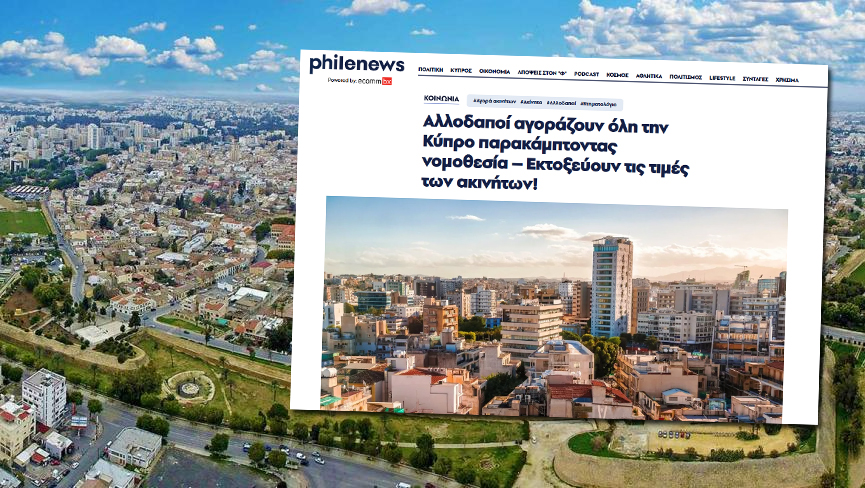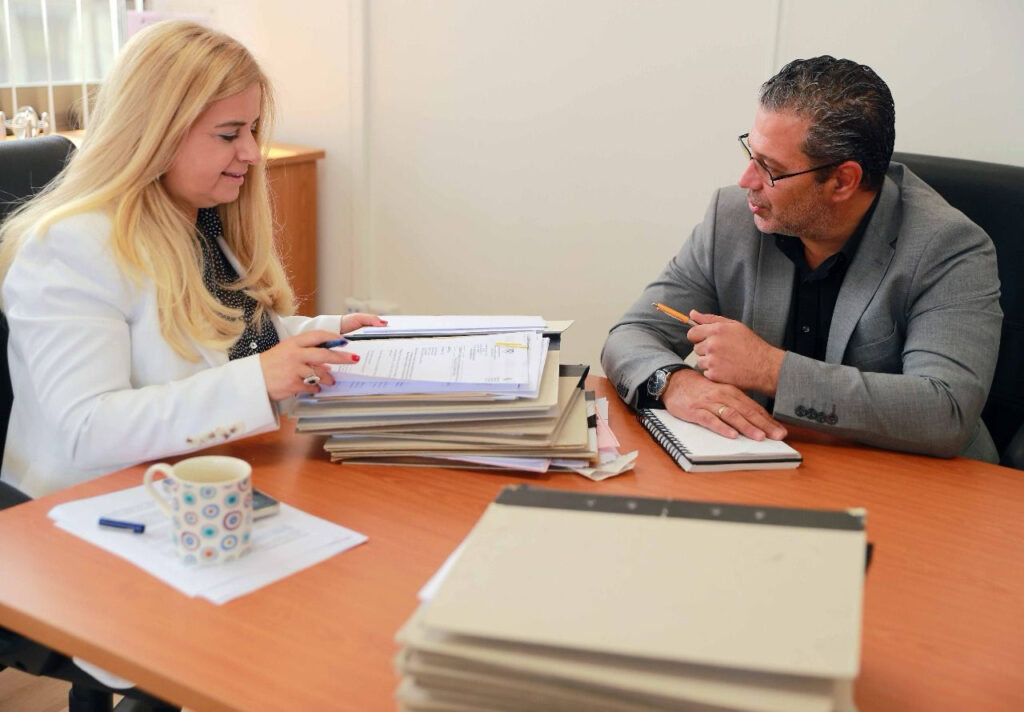Filenews 8 August 2025 - by Fanis Makridis
The Ministry of the Interior will attempt to put a barrier to the sale of Cypriot land to foreign persons, which was done recklessly and without the necessary due diligence controls.
The issue of trying to remedy the problem emerged at the end of July (29/7/25) through the response of the Minister of the Interior, Konstantinos Ioannou, to a parliamentary question by MP Nikos Georgiou dated 18/6/25. The whole issue was highlighted by "F" on 30/1/2025, on the occasion of a Law proposal by the MP of the Famagusta constituency that was discussed in the Parliamentary Committee on the Interior a day later.
The Minister, therefore, responding on July 29 to a recent relevant question by Nikos Georgiou, in essence acknowledged the problem, while indirectly making a government admission that the legislation is obsolete and that "it needs to be revised".
The important thing, however, is not the recognition of the problem, but the minister's report that contacts have already been made with the Legal Service to regulate the issue and more specifically the abolition of the existing legislation and the institutionalization of a new one.
In particular, the minister states in his reply: "Therefore, and following consultations with the Legal Service, the Ministry's intention is to promote the abolition of the existing legal framework and to prepare new legislation to regulate the issue. The process is at the stage of examining the gaps in the existing legislation."
The Ministry in the "F"
A competent person from the Ministry of the Interior, after a question from "F", told us yesterday that efforts for a legislative regulation of the issue are at an early stage, but officials of the Ministry have already been assigned to settle the issue. He explained that they are already working on the existing legislation and are focusing on the points that need to be replaced, preparing relevant proposals.

The problem
As "F" had written last January, the legislation set restrictions for foreign persons. However, the relevant Law is circumvented, as nationals of other countries with the existing data today buy property through legal entities, i.e. companies, avoiding control. There is a loophole in the entire legislative framework.
The existing Law has restrictions (Article 3) on the acquisition of immovable property by a foreigner and more specifically, this is prohibited without prior permission from the Council of Ministers (this power was delegated to the provincial administrations). In fact, the relevant article of the Law determines the absolutely necessary area for the construction of a premises for a residence or business premises.
But as was highlighted in an article by Giorgos Koukounis (lawyer) in "F" about four years ago (14/6/2021), any restrictions are irrelevant. Mr. Koukounis characteristically noted: "(...) Any foreigner can set up a Cyprus company and acquire real estate regardless of its management or shareholding structure, without any restrictions. The question arises why the above restrictions should exist for natural persons, since they can acquire real estate through a company".
The whole issue has been characterized as socio-economic and has been associated with groups of citizens, such as young Greek couples, who are faced with the housing issue on a daily basis due to the rapid increase in real estate prices.
The Provincial Administrations...
Questions, however, also arise about the decision of the Council of Ministers to put itself out of the procedure. As we noted above, Article 3 of the Real Estate Acquisition (Foreigners) Law gave the power to the government body to approve or reject the purchase of land by a foreigner. However, this power, as the current Minister of the Interior mentions in his recent reply to Georgiou, was assigned by decision of the Ministry to the District Governors in 1999.
"Safeguarding the public interest"
Nikos Georgiou, commenting on the turn of the issue, said that the Minister of the Interior's response "confirms the need to revise the current legal framework governing the granting of a license for the acquisition of real estate by third-country nationals to the Republic of Cyprus". At another point in his statements, he said: "This issue has been highlighted with persistence on my part through a series of parliamentary interventions and questions, while a relevant law proposal has already been submitted, which is pending before the Parliament. This is an initiative that aims to enhance transparency, legal clarity and safeguarding the public interest." He concluded: "The granting of a licence to acquire immovable property to third-country nationals, although subject to restrictions, requires clear and rational rules. Lack of adequate regulation carries risks of circumvention of the law."
Even Turks can acquire land in the Republic
- The Registrar of Companies was working on solutions, the issue will be discussed by the Parliament in the autumn
As we had highlighted in our publication in the spring of 2025, based on the existing legislation, Turkish nationals can register companies in the Republic of Cyprus and through them acquire land in the areas where the Republic exercises effective control. In fact, the issue had been preoccupied by the Registrar of Companies, Irene Mylona Chrysostomou. Making statements in an interview with "F" on 4/5/2025, although careful in what she said (ed. national security issues), she gave clear indications that there is an attempt to legislate the issue.

We had asked whether a Turkish citizen "can become a landowner in the Republic through a corporate entity". The Registrar of Companies had told us at the time: "This particular issue has occupied us a lot. Being a Turkish citizen and applying to register a company in Cyprus and being either a shareholder or a director in that company, is a matter that our service examines. There are some procedures by which this national of this country is controlled. I cannot say more on this issue. However, there is a possibility that the Turkish citizen will register and have a company in Cyprus. Nevertheless, because there are cases where we refuse Turkish nationals to register companies in their name, such procedures have been initiated in order for the Registrar of Companies to be more established in his refusal."
The whole issue has already been dealt with by the parliamentary audit committee, while this body will meet again on the issue in the autumn.
It should be noted, however, that the two wanted sons of Simon Mistriel Aykout, who is accused of large-scale usurpation of Greek Cypriot land in the occupied areas, had acquired real estate in the Republic. We are talking about 51-year-old Afik Yakov and 49-year-old Michael Mistriel Aykut. Since January, the Unit for the Fight Against Cover-Up Offences has frozen property of the 51-year-old in the free areas worth €1.2 million.
A survey among the member states of the European Union, which we brought to light on 30/1/2025, reveals that there is no ban on foreigners when it comes to acquiring real estate. However, in several countries there are restrictions and controls, based on national legislation, and the scepticism that exists in European countries is evident. Strict measures are being taken in Finland, the United Kingdom and Greece.
